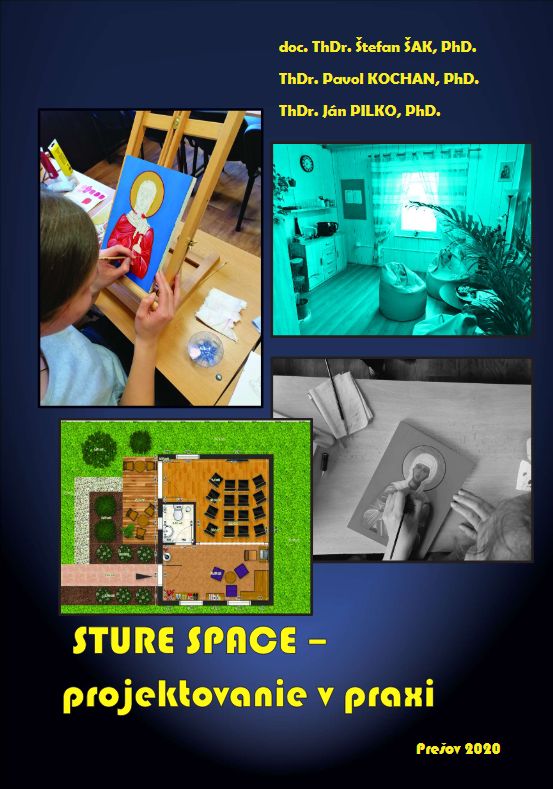HUSAR Jan - Acta Patristica, volume 11, issue 23/2020
STURE SPACE - designing in practice
/STURE SPACE – projektovanie v praxi/
/ Stefan Sak - Pavol Kochan - Jan Pilko, Presov : University of Presov, Faculty of Orthodox Theology, 2020, 80 p. ISBN 978-80-555-2577-8. – Štefan Šak – Pavol Kochan – Ján Pilko, Prešov : Prešovská univerzita v Prešove, Pravoslávna bohoslovecká fakulta, 2020, 80 s. ISBN 978-80-555-2577-8. /
(review)
 Jan Husar, assistant professor, Faculty of Orthodox Theology, University of Presov, Masarykova 15, 080 01 Presov, Slovakia, jan.husar@unipo.sk, 00421517724729
Jan Husar, assistant professor, Faculty of Orthodox Theology, University of Presov, Masarykova 15, 080 01 Presov, Slovakia, jan.husar@unipo.sk, 00421517724729
A monograph called STURE SPACE - designing in practice and with a range of 80 p. we can consider it as current and beneficial for the field of designing not only in the academic environment of the Orthodox Theological Faculty, but it is also well usable in other social sciences. The monograph is divided into the three chapters with several sub-chapters, which are preceded by an introduction and followed by a conclusion. The work is enriched with photographic material from the implementation of the project and a register of names. An adequate amount of scientific and professional literature, both domestic and foreign, was used in the creation of the scientific monograph.
The formal side of the monograph is at an appropriate level. On the technical and linguistic side, we state that the work is written grammatically and stylistically well, the text is clear and understandable. The readability of the text is supported by the larger font size used. Although the monograph has not been officially proofread, we do not notice any significant language shortcomings. We comment on the technical processing only so much that in future editions we would suggest making some changes in the formatting of the text itself.
The content of the thesis points to the excellent knowledge of the authors of the researched issues. The work is methodologically mastered. In terms of content, we would divide the monograph into two basic parts. The first part of the monograph describes theoretical knowledge in the field of design. Individual chapters contain a description of basic concepts in the field of project design and management. In the work, the authors relied on the latest knowledge in the field of design and its management, which were suitably supplemented by illustrated graphs. They came to the conclusion that there are not enough sources available in our environment about projects in academic research, which, despite a similar structure, are different from other types of projects. An analysis of the project in the academic environment also became a part of their implemented project. The second part of the monograph contains the authors' own empirical experience of design, which was confronted with theoretical knowledge. The uniqueness of the monograph is the concurrence of the writing of both parts, when the acquired knowledge was put by the authors into the process of verification in practice. Another important feature of the work is the implementation of the project in the academic research environment. Since the project itself falls into several categories within the experience, the work represents an attempt at a comprehensive penetration of individual types of projects.
Project management is also an integral part of project management, which deals with the basics of project management, i. j. project life cycle. The authors include the process of initiation, planning, execution, control and closing. As the authors of the monograph note, they verified the theoretical knowledge of the project management with their own project, which pointed out the abilities of the project management as well as possible shortcomings and problems encountered by the management. The publication offers a summary of new knowledge, which represents a significant help in finding design options in the academic environment for students and researchers and teachers. Of all the benefits, the most important authors consider the fact that a project in academic research, unlike other types of projects, is always successful, regardless of whether or not it has met the set goals. Its main goal is to gain knowledge from experience, which becomes a currency for future projects, not just the project implementers themselves. Each success or failure of fulfilling the set goals of the project shifts the possibilities and capabilities for a better prepared and implemented project in the future. The authors of the monograph consider motivation to be a key in the implementation of the project (at all stages). Finally, the success of the project stands on it.
The submitted monographic work meets all the requirements to be a benefit in the field of design and management.
